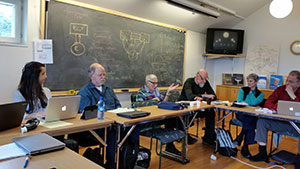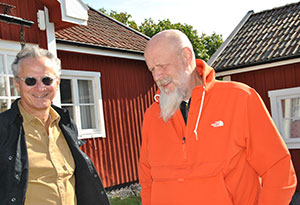UW Researcher Contributes to Study Showing Fertility Behavior and Consumption Shifts Can Help Environment
Published March 02, 2020

In the 21st century, economics works off the idea that people are motivated by both ego-driven preferences and social preferences, such as sharing with friends and neighbors (and strangers) based on culture and religion. This broader definition of preferences means that there are more tools available to attempt to address and correct environmental challenges.
A University of Wyoming researcher contributed to a paper that points to fertility behavior and consumer consumption patterns from the mid-19th century on as reasons for climate change. Both are driven, in part, by socially embedded attitudes and preferences rather than purely egoistic desires.
The finding that human attitudes and preferences are socially embedded suggests that fertility and consumption practices can be shifted downward and toward ecologically less intensive use of goods and services, according to the study.
“The take-away message is we need policies -- financial and social -- designed to specifically address how our local fertility decisions and consumption goals affect global biodiversity and the web of life that keeps us all alive and thriving,” says Jason Shogren, the Stroock Chair of Natural Resource Conservation and Management in UW’s Department of Economics and co-author of the paper.
The paper, titled “Social Dimensions of Fertility Behavior and Consumption Patterns in the Anthropocene,” appears in the March 2 (today’s) issue of the Proceedings of the National Academy of Sciences, one of the world’s most prestigious multidisciplinary scientific journals, with coverage spanning the biological, physical and social sciences.
Scott Barrett, the Lenfest-Earth Institute Professor of Natural Resource Economics and vice dean of the School of International and Public Affairs at Columbia University; Aisha Dasgupta, with the Population Affairs Division of the Department of Economic and Social Affairs at the United Nations; and Partha Dasgupta, the Frank Ramsey Professor Emeritus of Economics at Cambridge University, are the paper’s lead authors.
Other institutions whose researchers contributed to the paper are the University of Exeter; Arizona State University; the Institute of Environmental Science and Technology in Bellaterra, Spain; Institucio Catalana de Recerca in Barcelona, Spain; Vrije Universiteit Amsterdam in the Netherlands; Northwestern University; the University of Wisconsin; the University of Alaska-Fairbanks; the Royal Swedish Academy of Sciences in Stockholm, Sweden; Stanford University; Stockholm University; Universite Catholique de Louvain in Louvain-la-Neuve, Belgium; Princeton University; the University of Oslo in Oslo, Norway; the University of Minnesota; Wageningen University in Wageningen, the Netherlands; CSIRO Land and Water in Canberra, Australia; and the University of California-Davis.
“If we do not expect people to do the ‘right thing’ at the ‘wrong prices’ as economists, we can try to adjust/fix the prices such that people will choose, themselves, to do the right thing given the right prices,” Shogren says. “This is the idea of a pollution tax, or carbon tax or a cap-and-trade program. Economists and ecologists are working together to ask everyone to stop treating the environment as a free good and service. Let’s put a price on what is a valuable asset -- natural capital.”

If preferences are socially embedded, Shogren says “nudges” or social incentives can be implemented by government, institutions and private industry as default options in an attempt to “create economic value while protecting the environment.”
According to the study, the United Nations’ median projection of world population in the year 2100 is 10.9 billion. By 2100, three-quarters of the population increase from today’s 7.7 billion is expected to occur in sub-Saharan Africa. High numbers of children for a woman in that region equal high social standing. Women there have an average of 4.7 children over their lifetimes, compared to a world average of 2.5, according to the paper.
So, what can be done to curb population growth in this growing region of the world?
“Economists argue that health creates wealth which, in turn, means less infant mortality, and more skilled labor and more access to education for young girls,” Shogren explains. “All this translates into fewer children per capita as people get richer due to economic development. So, making people aware of this connection and how it affects their family and others will require more information on the interlinkages within a society. It is crucial to focus on the local level and stress how current social norms might lead to unintended consequences in the future.”
Shogren says the idea for the paper came out of discussions at the annual Asko Meetings in September 2016 organized by the Beijer Institute of Ecological Economics as part of the Swedish Royal Academy of Sciences. The meeting’s discussions focused on population, consumption and the risks to biodiversity. Shogren is a fellow and a member of the Beijer advisory board.
Shogren says his specific contribution to the paper was to participate in all the discussions at Asko and the Royal Academy about the ideas and content of the paper, and to offer up revisions to the paper as the group worked through the idea. While the study spanned 2016-2020, Shogren says the group of scholars and authors has been thinking for decades about the general challenge of integrating economics and ecology.
He adds that the paper can be useful to any group interested in understanding the long-term consequences of all of humans’ short-term actions.
“We all know there are consequences to our choices, but we do not always recognize all the potential impacts/risks that are lagged in time or distance in space,” he says. “This study highlights two key areas that are underappreciated -- fertility and overconsumption at a global level.
“The solutions come at all levels. The ‘think globally, act locally’ idea of the 1970s still holds,” Shogren adds. “Economists are less interested in command-and-control policy than we are in asking people to think more deeply about and to be willing to pay for the valuable goods/services provided by the environment/biodiversity. By thinking/paying for the services, people realize these nonmarket services are scarce and valuable.”

